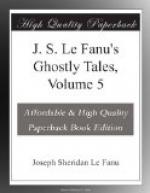But the lady was so beautiful they looked on her instead, and she continued to caress and kiss the little boy on her knee; and smiling at the other children she held up a large russet apple in her fingers, and the carriage began to move slowly on, and with a nod inviting them to take the fruit, she dropped it on the road from the window; it rolled some way beside the wheels, they following, and then she dropped another, and then another, and so on. And the same thing happened to all; for just as either of the children who ran beside had caught the rolling apple, somehow it slipt into a hole or ran into a ditch, and looking up they saw the lady drop another from the window, and so the chase was taken up and continued till they got, hardly knowing how far they had gone, to the old cross-road that leads to Owney. It seemed that there the horses’ hoofs and carriage wheels rolled up a wonderful dust, which being caught in one of those eddies that whirl the dust up into a column, on the calmest day, enveloped the children for a moment, and passed whirling on towards Lisnavoura, the carriage, as they fancied, driving in the centre of it; but suddenly it subsided, the straws and leaves floated to the ground, the dust dissipated itself, but the white horses and the lackeys, the gilded carriage, the lady and their little golden-haired brother were gone.
At the same moment suddenly the upper rim of the clear setting sun disappeared behind the hill of Knockdoula, and it was twilight. Each child felt the transition like a shock—and the sight of the rounded summit of Lisnavoura, now closely overhanging them, struck them with a new fear.
They screamed their brother’s name after him, but their cries were lost in the vacant air. At the same time they thought they heard a hollow voice say, close to them, “Go home.”
Looking round and seeing no one, they were scared, and hand in hand—the little girl crying wildly, and the boy white as ashes, from fear, they trotted homeward, at their best speed, to tell, as we have seen, their strange story.
Molly Ryan never more saw her darling. But something of the lost little boy was seen by his former playmates.
Sometimes when their mother was away earning a trifle at haymaking, and Nelly washing the potatoes for their dinner, or “beatling” clothes in the little stream that flows in the hollow close by, they saw the pretty face of little Billy peeping in archly at the door, and smiling silently at them, and as they ran to embrace him, with cries of delight, he drew back, still smiling archly, and when they got out into the open day, he was gone, and they could see no trace of him anywhere.
This happened often, with slight variations in the circumstances of the visit. Sometimes he would peep for a longer time, sometimes for a shorter time, sometimes his little hand would come in, and, with bended finger, beckon them to follow; but always he was smiling with the same arch look and wary silence—and always he was gone when they reached the door. Gradually these visits grew less and less frequent, and in about eight months they ceased altogether, and little Billy, irretrievably lost, took rank in their memories with the dead.




